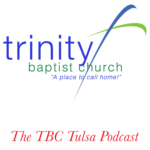This Sunday-morning expositional series by Pastor Rod Harris on the John 17 began on January 31, 2021. To listen to a sermon simply click on one of the titles below. The most recent message is cued up and ready to play at the top of the list; to begin listening to it, simply click the little grey triangle in the upper left hand corner of the playlist.
Christmas, What Exactly Are We Talking About?
Podcast: Play in new window | Download (Duration: 41:56 — 34.2MB)
Subscribe: Apple Podcasts | Email | TuneIn | RSS

This exposition of John 8:12-30, 48-59 by Pastor Rod Harris was delivered at Trinity Baptist Church on Wednesday evening, December 16, 2020.
Celebrating the Lord’s Table: Lessons From the Table
Behold Your King: Palm Sunday, 2018
The Joy of Jesus
Podcast: Play in new window | Download (Duration: 37:27 — 17.4MB)
Subscribe: Apple Podcasts | Email | TuneIn | RSS
This message from John 15:4-11, by guest preacher Jim Hatcher of Greater Europe Mission was delivered at Trinity Baptist Church on Sunday evening, August 20, 2017.
From Sorrow to Joy!
From Sorrow to Joy!: Resurrection Sunday
This is an exposition of John 19:31-20:18. This message by Pastor Rod Harris was delivered at Trinity Baptist Church on Sunday morning, April 16, 2017.
Podcast: Play in new window | Download (Duration: 37:03 — 17.2MB)
Subscribe: Apple Podcasts | Email | TuneIn | RSS
Intro:
You know the movie was good when you walk out of the theatre and you are drained. You’re not even sure you’re going to make it to the car. You’ve been sitting for the last two hours and watching a movie but you are drained. You are exhaust because the movie was so intense. You traveled through the whole range of emotions. You just don’t have anything left. You’re worn out, drained, dead on your feet and you look at your spouse and you say, “I could see that again!”
The problem is when you see that movie the second time – it’s lost something. It is not quite as intense the second time around. You know the hero is going to make it out alive. You know how it is going to end. Oh, you may still enjoy the movie but it just doesn’t compare with the first time.
There is, however, a story that never grows old.Continue reading
Living Sent
An exposition of John 20:21. This message by guest preacher Don Donell was delivered at Trinity Baptist Church on Sunday morning, July 24, 2016.
Podcast: Play in new window | Download (Duration: 53:07 — 24.3MB)
Subscribe: Apple Podcasts | Email | TuneIn | RSS
He Came
A Gospel message from John 1:11-12. This message by Roy Emmons was delivered at Trinity Baptist Church on Sunday morning, April 19, 2015.
The Best Meal You’ve Ever Had
This exposition of John 21:9-13 was delivered by guest preacher Bobby Reid at Trinity Baptist Church on Sunday morning, November 22, 2015.
In Times Like These
This message by guest preacher Rev. Billy Green was delivered at Trinity Baptist Church on Sunday morning, September 16, 2012.

